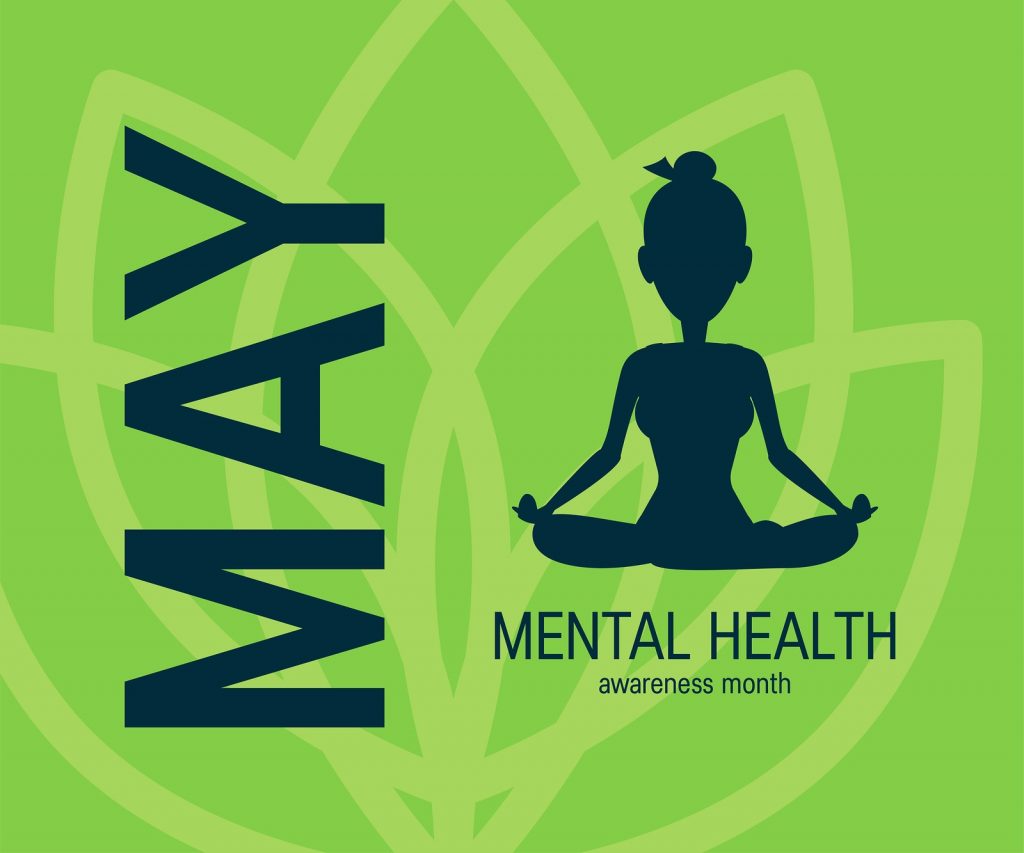
May is Mental Health Awareness Month, a time to remove stigma and attain mindful wellness. Each year, millions of Americans face the reality of living with a mental illness. Mental illness does not discriminate, affecting men and women, boys and girls of all ages, races and social classes. We need to fight the associated perceived shame, provide support, educate the public and advocate for policies that support people with mental illness and their families. (NAMI, April 2020)
Each one of us is dealing with our own personal stress and anxiety around COVID-19. We encourage you to focus on the following healthy aspects of daily living to promote mental wellness:
- Maintain uninterrupted sleep for 8 hours every night. Lack of sleep causes irritability, increased stress, forgetfulness, difficulties with learning and low motivation. Over time, it can contribute to anxiety and depression. (Interim, April 2020)
- Avoid unhealthy food choices such as excess sugar, greasy food, salt, processed foods, and saturated fat. Good nutrition is essential for good health, especially in times when we need our immune system to be strong. Quarantine and the temporary interruption of work can affect our usual eating habits, meaning less attention is made to consume healthy fresh foods.
- Consume more whole grains, greens, lean meats, and unsaturated fats. Eating a varied healthy diet is very important during times of stress. What we eat and drink can affect our body’s ability to prevent, fight and recover from illness and infection.
- Eat 2-3 well-balanced meals a day.
- Drink at least eight 8 ounce glasses of water a day to help to flush out bacteria and toxins in your body.
- Consume natural probiotics such as yogurt, miso, sauerkraut and kimchi. Fermented foods have become very popular, thanks to claims about their nutritional properties and reported health benefits, such as improving digestion, boosting immunity and helping people lose weight.
- Engage in physical activity for at least 30 minutes a day. It’s no secret that moving more helps us to be fitter and healthier. Research shows that as little as 30 minutes of exercise a day can boost our general health and feelings of well-being. (Stress Org, April 2020)
- Stay away from toxic thoughts, toxic people, and toxic conversations. These unpleasant influences create unnecessary complexity, strife, and, worst of all, stress.
- Engage in positive thoughts and conversations. It can be difficult to let go of anxiety. Develop positive mental habits and make them your new normal.
- Practice mindfulness or meditation daily. Meditation is the practice of thinking deeply or focusing one’s mind for a while. While there are many forms of meditation, the ultimate goal is a feeling of relaxation and inner peace, which can improve mental health.
- Stay present in your daily relationships. Staying present doesn’t mean that you’re avoiding or denying your thoughts, but it is a very effective way to relieve the symptoms of anxiety and depression, trauma, and suffering that are rooted in the past or tied to the future. (The KIM Foundation, April 2020)
- Avoid “screen time” and engage in more “in-person time”.
- Take time for yourself every day. You must check-in with yourself periodically. If you don’t, then you may not realize that things are changing or feel out of control. Checking-in with yourself allows you the opportunity to evaluate where you are in your journey to mental wellness.
Mental Health Awareness Month Reminds Us to Be Inclusive of Mind, Body and Spirit
Mental Health Awareness Month is a national, cooperative effort to inform people about the dangers of stress, successful coping strategies, and harmful misconceptions about mental health that are prevalent in our society. (Vital WorkLife, April 2020)
During difficult times, it is more important than ever to maintain our mental health. Keeping in touch by calling, texting, video calls, and social media can provide the opportunity to ensure that our loved ones are managing, as well as to stay connected ourselves.
We’re Here for You
Our Board-Certified ER Physicians are trained to deal with individuals in a mental health crisis. We have relationships with community resources and mental health professionals who can provide long-term guidance to families. Don’t suffer in silence, mental health is human health and we are here to be a trusted resource in any emergency situation.
Work Cited
“Mental Health Month.” NAMI, www.nami.org/Get-Involved/Awareness-Events/Mental-Health-Month.
“May Is Mental Health Awareness Month.” Interim, Inc., 10 Apr. 2020, www.interiminc.org/2020/04/10/may-is-mental-health-awareness-month/.
“Stress Awareness Month – April 2020.” The American Institute of Stress, 9 Apr. 2020, www.stress.org/stress-awareness-month-april-2020.
“Get Prepared: May Is Mental Health Awareness Month! – Self-Care: The Kim Foundation.” Mental Health & Suicide Prevention Blog | The Kim Foundation, 16 July 2019, www.thekimfoundation.org/blog/get-prepared-may-is-mental-health-awareness-month/.
Molinari, Marsha, and Licsw. “May Is Mental Health Awareness Month.” Insights from VITAL WorkLife, insights.vitalworklife.com/may-is-mental-health-awareness-month.
